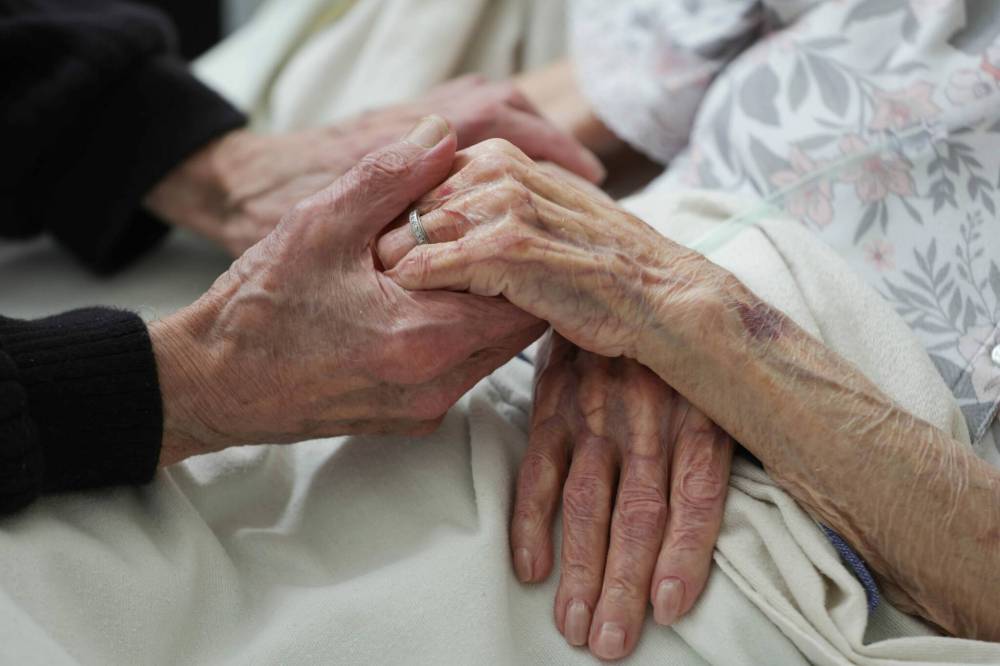Upgraded law to protect seniors in care languishes
Advertisement
Read this article for free:
or
Already have an account? Log in here »
To continue reading, please subscribe:
Monthly Digital Subscription
$0 for the first 4 weeks*
- Enjoy unlimited reading on winnipegfreepress.com
- Read the E-Edition, our digital replica newspaper
- Access News Break, our award-winning app
- Play interactive puzzles
*No charge for 4 weeks then price increases to the regular rate of $19.00 plus GST every four weeks. Offer available to new and qualified returning subscribers only. Cancel any time.
Monthly Digital Subscription
$4.75/week*
- Enjoy unlimited reading on winnipegfreepress.com
- Read the E-Edition, our digital replica newspaper
- Access News Break, our award-winning app
- Play interactive puzzles
*Billed as $19 plus GST every four weeks. Cancel any time.
To continue reading, please subscribe:
Add Free Press access to your Brandon Sun subscription for only an additional
$1 for the first 4 weeks*
*Your next subscription payment will increase by $1.00 and you will be charged $16.99 plus GST for four weeks. After four weeks, your payment will increase to $23.99 plus GST every four weeks.
Read unlimited articles for free today:
or
Already have an account? Log in here »
Hey there, time traveller!
This article was published 14/09/2023 (819 days ago), so information in it may no longer be current.
Nearly four months after the Stefanson government passed a bill to protect seniors in care from abuse and neglect, the most critical part of the proposed legislation still hasn’t been enacted into law.
Changes to the Protection for Persons in Care Act were approved earlier this year, after a Manitoba auditor general investigation found widespread physical abuse against elderly people in personal care homes have been ignored for years.
The abuse cited in the report, release in July, included residents being sexually assaulted, kicked in the shin, hit in the face with a remote control and pinned down and verbally abused. In each case, the allegations were deemed “unfounded.”

RUTH BONNEVILLE / WINNIPEG FREE PRESS FILES
Changes to the Protection for Persons in Care Act were approved earlier this year, after a Manitoba auditor general investigation found widespread physical abuse against elderly people in personal care homes have been ignored for years.
Justice Minister Kelvin Goertzen described the abuse as “sickening and repulsive” during a news conference in July. Despite that, existing provisions in the law that allow officials to cover up legitimate cases of abuse have still not been changed. The abuse could still be happening.
The main deficiency in the Protection for Persons in Care Act, which governs how allegations of abuse and neglect are investigated, is a faulty definition of what constitutes harm against seniors in care.
The legal glitch, which has been known by government for years, has allowed senior officials to categorize legitimate cases of abuse and neglect as “unfounded,” auditor general Tyson Shtykalo found in his investigation (conducted between October 2021 and July 2022).
The Stefanson government vowed to change that.
“There are few things more important in society than protecting vulnerable persons,” Goertzen said in July. That pledge has not been followed up with swift, concrete action.
The Tories have said they plan to disband the Protection for Persons in Care Office, the agency that responds to such allegations of abuse. They plan to replace it with an independent officer of the legislative assembly.
However, the timeline for doing so could take up to two years — an unacceptable (and entirely unnecessary) delay given the urgency of the matter.
More importantly, the legislative amendments to change the definition of abuse and neglect in the act have still not been proclaimed. Until that is done, legitimate cases could still be deemed “unfounded.”
Bill 23, which amended the Protection for Persons in Care Act, was passed by the legislative assembly May 30. The changes, among other things, redefine neglect and abuse to better reflect legitimate cases of harm against seniors.
However, not all parts of the bill came into effect when it received royal assent.
Sec. 79, which establishes the new definitions, only comes into force “on a day fixed by proclamation.” Cabinet must pass an order in council to enact that section of the bill.
Almost four months later, Premier Heather Stefanson and her Tory cabinet have failed to do so and have not said when they plan to make the change.
“Currently, the sections you reference are not yet proclaimed because regulatory work needs to be done related to the definitions so that the act and regulations are aligned,” a Stefanson government spokesperson told the Free Press in an email.
Not all bills passed by the legislative assembly are enacted into law right away. Some must be proclaimed by cabinet.
Most bills are proclaimed “upon royal assent,” meaning they’re enacted by the lieutenant governor during a legislative session. In some cases, certain sections of a bill must be proclaimed by cabinet, such as Bill 23.

MIKE THIESSEN / WINNIPEG FREE PRESS FILES
Justice Minister Kelvin Goertzen described the abuse as “sickening and repulsive” during a news conference in July.
There are often good reasons for delaying the enactment of a bill, or parts of it, including the need to draft regulations to provide further detail on how the legislation should be applied.
However, sometimes government drags its feet on proclaiming a bill for no legitimate reason. Entire bills, or parts of them, can be held up for months or years because regulatory changes have not been made or because cabinet simply chooses not to enact a new law.
Given the urgency of protecting seniors in care, all of Bill 23 should have been proclaimed by now.
Government has known about serious cases of abuse in personal care homes for years. Prior to the auditor general’s report, several government probes highlighted ongoing abuse in personal care homes and the need for legislative change to investigate them effectively.
An internal service review by Manitoba Family Services in 2016 recommended, among other things, “staff and management have pointed to a need for changes to be made to the legislation, specifically to the definitions of abuse and neglect.”
Despite that, government took no action.
Around the same time, the Protection of Persons in Care Office, without explanation, stopped publishing annual reports, which government also ignored.
Prior to 2016, the PPCO reported more than 2,000 cases of abuse or neglect every year, yet only 20 per cent of them were fully investigated, in many cases because of the flawed definition of abuse and neglect. In some cases, managers changed the conclusions of investigators from “founded” to “unfounded” because they claimed the alleged abuse didn’t meet the definition under the act.
In 2019, the PPCO began drafting proposed legislative amendments to change the definition of abuse and neglect. However, those efforts were abandoned without explanation.
Now, almost four months after changes were approved by the legislative assembly, the Stefanson government still hasn’t enacted them.
Apparently, it’s not a priority.
tom.brodbeck@freepress.mb.ca

Tom Brodbeck is an award-winning author and columnist with over 30 years experience in print media. He joined the Free Press in 2019. Born and raised in Montreal, Tom graduated from the University of Manitoba in 1993 with a Bachelor of Arts degree in economics and commerce. Read more about Tom.
Tom provides commentary and analysis on political and related issues at the municipal, provincial and federal level. His columns are built on research and coverage of local events. The Free Press’s editing team reviews Tom’s columns before they are posted online or published in print – part of the Free Press’s tradition, since 1872, of producing reliable independent journalism. Read more about Free Press’s history and mandate, and learn how our newsroom operates.
Our newsroom depends on a growing audience of readers to power our journalism. If you are not a paid reader, please consider becoming a subscriber.
Our newsroom depends on its audience of readers to power our journalism. Thank you for your support.






